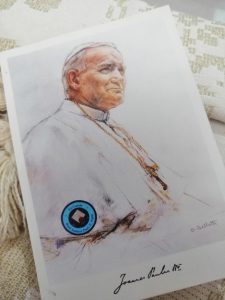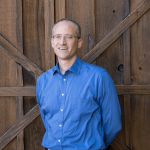
The Tragedy of Sin — Part 2
September 13, 2023

As we began to explore last time, at the beginning of human history, there was a fundamental break from the state of original innocence enjoyed by our first parents, who enjoyed harmony within themselves, in their friendship with God, in relationship with each other, and in relation to the rest of creation. The “ancient serpent, who is called the Devil and Satan, the deceiver of the whole world” (Rev 12:9) succeeded in inducing our first parents to sin by sowing seeds of doubt into their minds and hearts. Let’s dig deeper into the nature of this temptation and see what relevance it has for us today.
Recall that, in creation, God bestowed a special dignity to man by creating us in His image and likeness and establishing man as lord and steward of the visible world. Even more, God breathed divine life into us, placing us in a special relationship with Him and destining us to someday partake in His glory. In this context, God commanded out first parents not to eat of the tree of the knowledge of good and evil. While this may seem an arbitrary prohibition, Pope St. John Paul II, in his catecheses on sin, highlighted how this command is essentially a reminder to man that we are creatures. Through this command, God was saying to our first parents and to all of us,

“Remember that you are a creature called to friendship with God, who alone is your Creator. Do not wish to be what you are not! Do not wish to be ‘like God.’ Act in accordance with what you are, and all the more willingly since this is already such an exalted status, that of being ‘the image and likeness of God’… [This] status… obliges you to act in conformity with what you are. So be faithful to the covenant that God the Creator has made with you, a creature, from the beginning” (Nov. 12, 1986).
To be a creature, is to be the recipient of the unmerited gifts of life and existence. God loves His creation into existence and sustains it in being through the power of His love at every moment. With our creaturely status comes dignity, love, blessing, and obligations. All creatures are called to act in accord with the nature they have received and toward the end for which they were created. Being created as free, rational persons, man is called to freely cooperate with God’s will, using his gifts of freedom and reason to reign over the earth and make it more and more a reflection of God’s infinite love, beauty, wisdom, and goodness. Even more, man is called to come to know and love God with his whole heart and mind and enter into eternal communion with Him.

The prohibition from eating from the tree of the knowledge of good and evil, more than an arbitrary rule, is a loving reminder of man’s status and a protection against pride. Through this prohibition, God was telling our first parents that He alone has the authority to determine what is good and evil. Man cannot decide these things but must — for his own good — act in accord with the order established by God.
Satan casts doubt on God’s intentions and plants the idea in man’s mind that we can take good and evil into our own hands. We can become like God and determine right from wrong. He entices us to think that God is suppressing us, alienating us from our potential. In order to be fulfilled, we must reject His laws and embrace autonomy (i.e., become a law unto oneself). Only then can we truly be free and come into our own.

This dynamic between Satan and our first parents reveals the inner logic of sin, which affects us even today. How often does modern man seek to reject his Creator and the created order? How often do we try to re-create ourselves according to the image we conceive rather than receiving our nature and identity from God? How often do we reject God’s laws and those of His Church as arbitrary impositions that keep us from our happiness rather than seeing them as the royal road to happiness? How often do we suspect God of oppressing us and having evil intentions toward us rather than trusting fully in His infinite, unchanging, Fatherly love for us? How often do we take matters into our own hands rather than waiting hopefully upon the Lord?
In truth, it is not God who robs us of our dignity and blocks our deepest desires. Rather it is sin that alienates us from God, from ourselves, and from one another. It is sin that wounds our dignity, our hearts, and our world and robs us of grace, peace, and joy. By pondering further the tragedy of sin and its effects on us, we can learn to reject the lies of the enemy and receive more fully and gratefully the gift of redemption in Christ.
Note: This article is part of a series of reflections on Pope St. John Paul II’s “Theology of the Body.”

Written by, Dr. Andrew Sodergren, M.T.S., Psy.D.,
Director of Ruah Woods Psychological Services
(Article originally published in The Catholic Telegraph, December 2022 Issue, the official magazine of the Archdiocese of Cincinnati)
Share